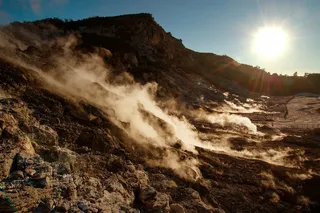This article is reposted from the old WordPress incarnation of Not Exactly Rocket Science.
For decades, anthropologists have debated over why pygmies have evolved to be short. Amid theories about their jungle homes and lack of food, new research suggests that we have been looking at the problem from the wrong angle. The diminutive stature of pygmies is not a direct adaptation to their environment, but the side-effect of an evolutionary push to start having children earlier.
Andrea Migliano at the University of Cambridge suggests that pygmies have opted for a ‘live fast, die short’ strategy. Their short lives gives them very limited time as potential parents, and they have adapted by becoming sexually mature at a young age. That puts a brake on their pubescent growth spurts, leaving them with shorter adult heights.
Pygmies are technically defined as groups of people whose men are, on average, shorter than 155cm ...













